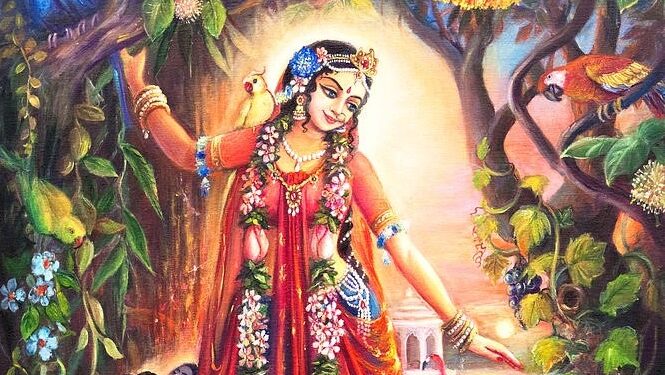Śaṅkhacūḍa enjoyed his kingdom for one manvantara (4,320,000 years) and, during that period, gained control over all the Devas, Dānavas, Gandharvas, Kinnaras and Rākṣasas. He dispossessed the gods of their realms and privileges, deprived them of their rights with respect to worship and offerings, and seized their weapons and ornaments. Consequently, they wandered about the universe like helpless beggars. Finally, they united in a group and went to Lord Brahmā’s assembly. Sobbing, they related the whole story of how Śaṅkhacūḍa had oppressed them. Lord Brahmā took them to Lord Śiva’s realm and related to Śiva the details of the case.
Lord Śiva then took them all to the highest place, Vaikuṇṭha, where there is neither old age nor death. As they approached the first gate, they saw the watchmen guarding the gate and sitting on jeweled seats. The watchmen had beautiful dark blue bodies and looked effulgent. They had smiles on their faces, lotuslike eyes, and four arms-each hand holding a conch, mace, disc and lotus. They wore yellow garments, were decorated with jeweled ornaments, and were garlanded with forest flowers.
Lord Brahmā asked them for admittance and they nodded their approval. Then, after passing through sixteen gates, the group finally arrived before Lord Nārāyaṇa. The assembly hall was filled with saints and four-armed attendants who resembled Nārāyaṇa and were wearing Kaustubha jewels. The assembly hall was so brilliant with rays of light that it appeared as though the moon had just arisen. By Lord Nārāyaṇa’s mercy, there were diamonds, gems and necklaces of jewels placed in various areas. In some spots there were rows of pearls that shed their splendor and brilliance, and in other spots there were mirrors arranged in a circle. In certain areas there were jewels called padmarāgas which were artistically arranged to appear like lotuses spreading their radiant beauty everywhere. There were rows of steps made of Syamantaka jewels. Throughout the hall were wonderful pillars built of indranīla jewels. There were sandal leaves strung high from pillar to pillar. There were also golden jars full of water. All around were pārijāta-flower garlands, sweet-scented sandal trees, and saffron and musk; the whole atmosphere was permeated with sweet fragrances.
The Vidyādharas were dancing in one area. The assembly hall measured eight thousand miles in circumference. All over, numerous servants were engaged in various services. Lord Brahmā, Lord Śiva and other demigods saw Lord Hari (Nārāyaṇa) sitting in the center on a precious jeweled throne; He looked like the moon surrounded by many stars. He was wearing a crown on His head, earrings, a wildflower garland round His neck and sandal paste on His body. Holding a lotus in His hand, He was smiling, watching the dancers and listening to the music. He looked very tranquil. Lakṣmī was gently holding His feet and He was chewing the sweet-scented betel she had given Him. Gaṅgā was fanning Him devotedly with a white cāmara (whisk), and others were singing hymns to Him with their heads lowered in devotion.
Lord Brahmā and the other gods offered their obeisances to Lord Viṣṇu. As they did, their hairs stood on end, tears flowed from their eyes and their voices were choked with emotion. Then Lord Brahmā, his hands clasped and his head bowed, informed the Lord about Śaṅkhacūḍa’s doings.
Lord Hari smiled and said, “O lotus born! I know all about Śaṅkhacūḍa. In his previous birth he was my great devotee, a very energetic cowherd boy in Goloka. I will tell you something about him which is quite sanctifying. His name was Sudāmā and he was my chief attendant. He is now a Dānava because in Goloka Rādhā pronounced a terrible curse on him. Here is how it happened…
“One day I left Rādhā’s company and went to the rasa dance area with the gopī named Virajā. Rādhā soon heard from one of Her maidservants that I had flirted with Virajā. Blinded with fury, She hastened there with Her attendants to see if this were true. Seeing that it was, Rādhā immediately converted Virajā into a river. I myself disappeared, so Rādhā rushed home angrily with Her attendants.
“Later, when I was with Sudāmā and She saw me, Rādhā rebuked me very much. However, I remained silent. But Sudāmā could not tolerate this, so he rebuked Rādhā in My very presence. This was quite intolerable to Her dignity. Her eyes became red with anger and She immediately ordered thousands of Her attendants to drive him away. Sudāmā then trembled with fear. As Rādhā’s attendants tried to drive him away, he resisted and repeated his reproaches against Her. When She heard them, She cursed him, saying, ‘May you be born in the womb of a Dānavī (demon woman)!’
“Sudāmā bowed down to Me and, crying, began to leave. But Rādhā, who is quite merciful, began to melt. Weeping, she tried repeatedly to stop him from leaving. ‘Wait!’ She called. ‘Wait! Where are you going? You don’t have to go. Please come back.’ She became distressed, and Her attendants and the cowherd boys began to weep. I then explained to them, ‘In about a half a moment Sudāmā will return, having fulfilled the conditions of the curse. Of course a half moment here is equal to about one manvantara (4,320,000 years) on Earth.’ I then called to Sudāmā. ‘O Sudāmā, when the curse expires, please come back here!’
“O demigods, that expert mystic and devotee Śaṅkhacūḍa will return to Goloka. Therefore, O gods, take My trident and go quickly to India. Lord Śiva will kill the Dānava with the trident. The demon is wearing My auspicious amulet around his neck. It is called ‘Conqueror of the World.’ As long as he keeps wearing it, no one can kill him. So I will go to him disguised as a brāhmaṇa and beg for the amulet. But you have granted him the boon that he cannot die unless his wife’s chastity is violated. I will take care of this as well. Then he will surely die. Later, when his wife leaves her body, she will become my dearest wife.” Nārāyaṇa then gave Lord Śiva his trident.















